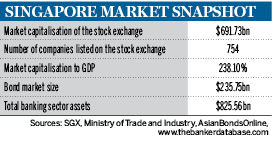Tiny Singapore has its hands full in trying to maintain its status as a financial hub of Asia. To succeed, it is stoking the fires of financial technology (fintech).
In November, more than 13,000 people gathered in Singapore to attend the inaugural FinTech Festival. The highlight was the FinTechHackcelerator, in which 19 start-ups chosen from a pool of 655 international applicants demonstrated their hottest innovations, from payment systems to portfolio analysis tools.
The organiser, the Monetary Authority of Singapore (MAS) – Singapore’s central bank – is now at work planning this year’s festival.
Positive approach
“One of the main reasons to come to Singapore is that the government is very proactive,” says Gene Vayngrib, a festival participant and CEO of US company Tradle, which provides blockchain-based compliance technology for banks. “It reaches out to start-ups. It is much easier to work with regulators that are seeking out innovations to bring to the market.”
According to KPMG, the city’s fintech industry generated $50.6m in venture capital investment in 2016, nine times more than the $5.4m raised in 2011. In 2015, a few large deals pushed the tally to a record $171.8m.
Finance is an integral part of the Singaporean economy, contributing 13.1% of gross domestic product in 2016. The rise of fintech promises to help keep the sector humming and cement Singapore’s position as south-east Asia’s financial centre.
Indeed, fintech is blossoming in this corner of the continent, bringing financial services to even remote islands of Indonesia and the Philippines through mobile networks. Singapore makes a logical jumping-off point for regional expansion.
Yuen Tuck Siew, co-founder and chief executive of Jirnexu, a Malaysian company that runs financial product comparison websites, can attest to this. Early last year, Jirnexu raked in $3m in its first major round of fundraising in Singapore. “When I started [preparing for] fundraising in 2014, there were very few venture investors in Malaysia,” he says. “When you have strong investors in the [early stage], it validates your brand.”
A good brand
Liew Nam Soon, managing partner for south-east Asia financial services at Ernst & Young, agrees. Because Singapore is an established financial centre and its regulator is progressive in adopting fintech, “the fact that you raised money in Singapore gives a brand equity”, he says.
A government that is willing to provide seed money helps Singapore’s cause. The National Research Foundation provided venture capital funds owned by large local corporations with S$40m ($28m) in May 2016. The money came with instructions to invest in early-stage, local technology start-ups, including fintech outfits. Previously, the foundation had provided a total of S$100m to 11 projects in 2008 and 2014.
All this seed money attracts other investors. In 2015, Russian venture capital player Life.Sreda, which focuses on mobile fintech and internet start-ups, moved its headquarters to Singapore from Moscow. Since then, it has invested in eight fintech companies in south-east Asia.
Igor Pesin, a partner and investment director at Life.Sreda, cites the well-developed infrastructure for funds, low taxes and the availability of capital as reasons to choose Singapore. To help keep the money flowing, in February the MAS announced a plan to relax venture capital regulations.
In on the act
Singapore’s emphasis on fintech is not exclusive to the private market. The Singapore Exchange wants to position itself as a go-to capital market for tech companies. This is partly why it is looking to introduce a dual-class share structure, which would allow certain shareholders, typically a company’s founders, to have heavy voting rights despite their light shareholdings.
But interest in fintech is growing elsewhere in the neighbourhood. Jirnexu’s Mr Siew has not decided whether his next fundraising round will be in Singapore. “I will look all over south-east Asia if there are strategic investors,” he says.
Chia Tek Yew, head of financial services advisory at KPMG Singapore, says in order to stay ahead, Singapore “needs to attract fintech venture capital firms who can lead larger rounds of financing”.













